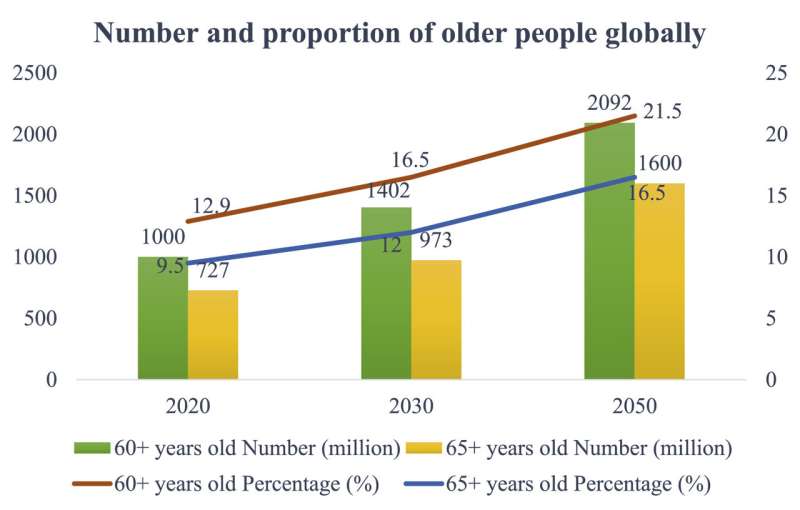This article has been reviewed according to Science X's editorial process and policies. Editors have highlighted the following attributes while ensuring the content's credibility:
fact-checked
trusted source
proofread
With an aging population, 'silver tourism' an avenue for industry growth

There is a significant opportunity to take advantage of the untapped market of "silver tourism," paving the way to not only grow the economy but also offer an ever-increasing aging population the opportunity to maintain quality of life.
A new study by Edith Cowan University (ECU) has noted that increasing life expectancy and declining fertility are contributing to rapid aging in the global population. By 2020, around one billion of the global population was aged over the age of 60, and 727 million was aged over 65.
The figures are projected to reach 2.092 billion and 1.6 billion, respectively, in 2050.
Lead researcher and Ph.D. candidate at ECU, Fangli Hu noted that countries like Japan, South Korea and Italy were already considered to be aging or even super-aging societies. While advances in technology and medicine have extended life expectancy, there has not been a corresponding increase in healthy life expectancy.
"Rapid aging is already one of the most significant trends of the 21st century, and this demographic shift poses enormous challenges for society. There is a community-wide effort to promote healthy aging, but the role of tourism as an important service industry in this process has been underappreciated," Ms. Hu said.
"Tourism and hospitality, one of the largest industries globally, is duty-bound to participate in initiatives to support healthy aging. Although extant tourism and hospitality research has identified this niche market, attempted to understand its travel behaviors, and proposed senior tourism, silver tourism, and geriatric tourism to accommodate the aging population, the industry is still far from creating age-friendly destinations."
Considering their strong purchasing power, abundant leisure time, and high travel willingness, the aging population has been identified as an unignorable tourist group," Ms. Hu said.
However, researcher Dr. Jun Wen noted that service discrimination and tourism inequalities against older adults are still prevalent.
"More leisure time and disposable income make the aging population an important and fast-growing tourist segment, but greater vulnerability and group diversity complicate the travel behaviors and psychology of older adults, resulting in higher demands for products and services.
"Therefore, it is imperative to pursue more in-depth research and make greater efforts to enable this niche market to enjoy tourism."
Dr. Wen said that for the tourism industry to capitalize on silver tourism, significant investment would need to be made in infrastructure and training.
"The training is especially important for frontline service employees. They currently don't have the knowledge and experience needed to interact with people living with certain health conditions."
Researcher Associate Professor Joshua Aston remarked that the aging population is often perceived as a demographic requiring significant support, burdening society with various challenges such as age-related discrimination, elder abuse, violence, stigma, and exclusion across different contexts. These circumstances not only infringe upon their fundamental human rights but also hinder their full integration into society.
Dr. Aston said that despite advancements, discrimination in services and tourism inequalities against older individuals persist.
"While the aging population represents a crucial and rapidly expanding tourist segment, with more leisure time and disposable income, their vulnerability complicates the understanding of their travel behaviors.
Health benefits
Ms. Hun noted that travel could serve as a potential support for healthy aging and improve the health and quality of life for this sector of the population, in addition to contributing to the quest for equal rights among this group.
"COVID-19 highlighted the health value of tourism in public health beyond lifestyle and economic factors. Specifically, travel can be a non-pharmacological therapy," she added.
"Travel is a multi-component leisure activity involving food, accommodation, transportation, visits, shopping, and entertainment. It can contribute more to the functional ability to facilitate healthy aging than single-dimensional activities; however, despite increasing interest in the health benefits of tourism, the tourism and hospitality literature has focused more on the impacts on the younger and healthier populations and less on its potential role for senior tourists and healthy aging," Ms. Hun said.
"Tourism has the potential to promote the mental health of people with autism, depression, dementia, and other conditions, and could be as therapeutic as other non-pharmacological interventions such as music therapy."
"Bringing reciprocity to tourism and medical sciences, travel therapy may serve as a promising non-pharmacological prevention and treatment for everyone, notably the aging population, a group that is at elevated risk for chronic diseases. Thus, deeper reflection and exploration of the role of travel therapy in healthy aging is highly essential."
The research is published in the Journal of Hospitality and Tourism Management.
More information: Fangli Hu et al, The role of tourism in healthy aging: An interdisciplinary literature review and conceptual model, Journal of Hospitality and Tourism Management (2023). DOI: 10.1016/j.jhtm.2023.07.013
Provided by Edith Cowan University



















